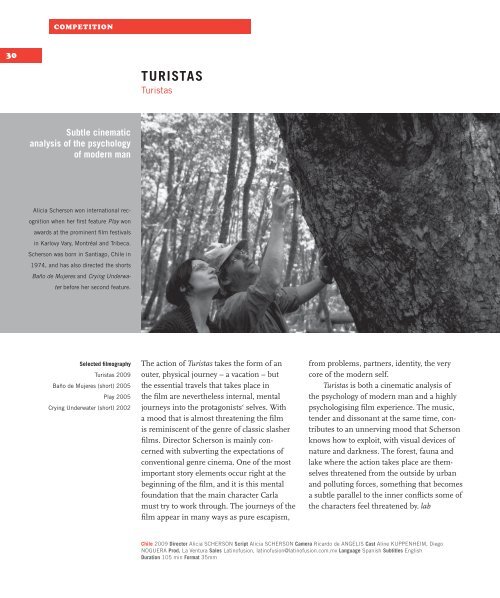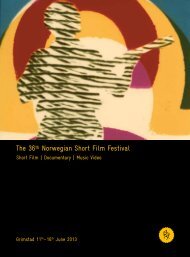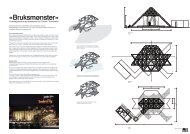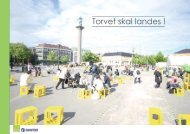av Ciro Guerra En episk road-movie i eselfart fra ... - Klapp Media
av Ciro Guerra En episk road-movie i eselfart fra ... - Klapp Media
av Ciro Guerra En episk road-movie i eselfart fra ... - Klapp Media
Create successful ePaper yourself
Turn your PDF publications into a flip-book with our unique Google optimized e-Paper software.
30<br />
COMPETITION<br />
Subtle cinematic<br />
analysis of the psychology<br />
of modern man<br />
Alicia Scherson won international rec-<br />
ognition when her first feature Play won<br />
awards at the prominent film festivals<br />
in Karlovy Vary, Montréal and Tribeca.<br />
Scherson was born in Santiago, Chile in<br />
1974, and has also directed the shorts<br />
Baño de Mujeres and Crying Underwa-<br />
ter before her second feature.<br />
Selected filmography<br />
Turistas 2009<br />
Baño de Mujeres (short) 2005<br />
Play 2005<br />
Crying Underwater (short) 2002<br />
TURISTAS<br />
Turistas<br />
The action of Turistas takes the form of an<br />
outer, physical journey – a vacation – but<br />
the essential tr<strong>av</strong>els that takes place in<br />
the film are nevertheless internal, mental<br />
journeys into the protagonists‘ selves. With<br />
a mood that is almost threatening the film<br />
is reminiscent of the genre of classic slasher<br />
films. Director Scherson is mainly concerned<br />
with subverting the expectations of<br />
conventional genre cinema. One of the most<br />
important story elements occur right at the<br />
beginning of the film, and it is this mental<br />
foundation that the main character Carla<br />
must try to work through. The journeys of the<br />
film appear in many ways as pure escapism,<br />
from problems, partners, identity, the very<br />
core of the modern self.<br />
Turistas is both a cinematic analysis of<br />
the psychology of modern man and a highly<br />
psychologising film experience. The music,<br />
tender and dissonant at the same time, contributes<br />
to an unnerving mood that Scherson<br />
knows how to exploit, with visual devices of<br />
nature and darkness. The forest, fauna and<br />
lake where the action takes place are themselves<br />
threatened from the outside by urban<br />
and polluting forces, something that becomes<br />
a subtle parallel to the inner conflicts some of<br />
the characters feel threatened by. lab<br />
Chile 2009 Director Alicia SCHERSON Script Alicia SCHERSON Camera Ricardo de ANGELIS Cast Aline KUPPENHEIM, Diego<br />
NOGUERA Prod. La Ventura Sales Latinofusion, latinofusion@latinofusion.com.mx Language Spanish Subtitles <strong>En</strong>glish<br />
Duration 105 min Format 35mm<br />
THE WINDOW<br />
La Ventana<br />
Bedridden after a cardiac arrest, Antonio<br />
(Antonio Larreta) lies waiting for his son.<br />
Bound to his bedroom by an intr<strong>av</strong>enous<br />
drip, he sees the fields, the sun and the life<br />
outside his window. From his bed Antonio is<br />
in total control of what goes on in his house<br />
and all the preparations for his son‘s homecoming.<br />
Despite the well-meaning advice of<br />
his nurses, and without their knowing, he<br />
embarks on a trip into the world to which he<br />
once belonged.<br />
To honour his son, a world-famous pianist,<br />
he has asked that the house piano shall<br />
be tuned and the piano tuner‘s notes wind<br />
their way throughout the film. These <strong>fra</strong>il<br />
notes, together with the buzzing of the bees<br />
and the merciless ticking of a grandfather<br />
clock, make the film experience quiet and<br />
poetic. Similarly, nothing in the film is overly<br />
spelled out, instead it is entrusted to the<br />
subtlety of suggestion.<br />
Sorin masterfully draws parallels between<br />
the circle of life and the circle of Antonio‘s<br />
last day. Strongly influenced by Ingmar Bergman‘s<br />
Wild Strawberries, this is a film that<br />
celebrates mortality and the down to earth. ek<br />
Argentina, Spain 2008 Director Carlos SORÍN Script Carlos SORÍN Camera Julían APEZTEGÍA Cast Antonia LARRETA, María del Carmen<br />
JIMÉNEZ Prod. Guacamole Films, S.A Sales B<strong>av</strong>aria Film, sales@b<strong>av</strong>aria-film.de Language Spanish Subtitles <strong>En</strong>glish Duration 85 min<br />
Format 35mm<br />
COMPETITION<br />
Even the dying can wait<br />
for something worth<br />
living for<br />
Carlos Sorin (b. 1944) is perhaps<br />
best known for his Historias Mínimas<br />
(2002) for which he has won several<br />
awards, including one at the Tromsø<br />
International Film Festival. With his<br />
background as a director, producer and<br />
screenwriter, he is a prominent figure in<br />
Argentinean cinema.<br />
Selected filmography<br />
The Window 2008<br />
El Camino de San Diego 2006<br />
El Perro 2004<br />
18-j 2004<br />
Historias Mínimas 2002<br />
La Película del Rey 1986<br />
31





